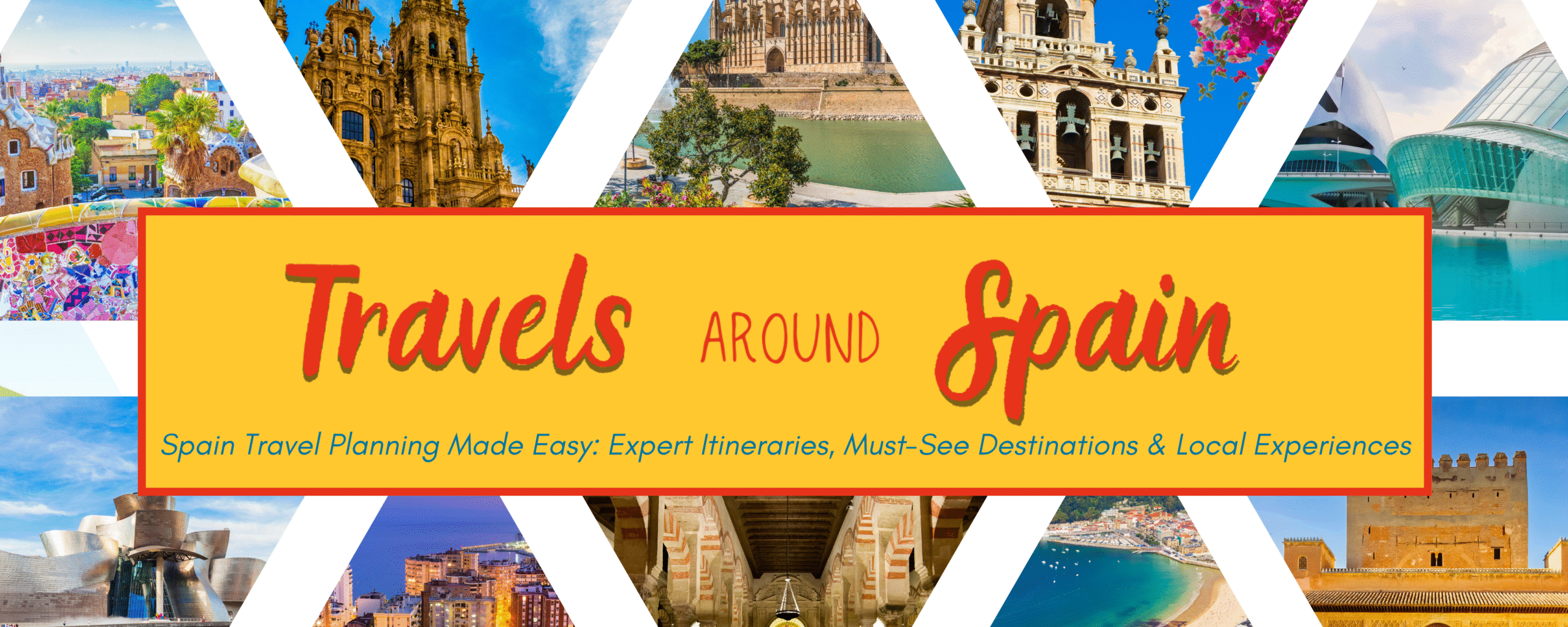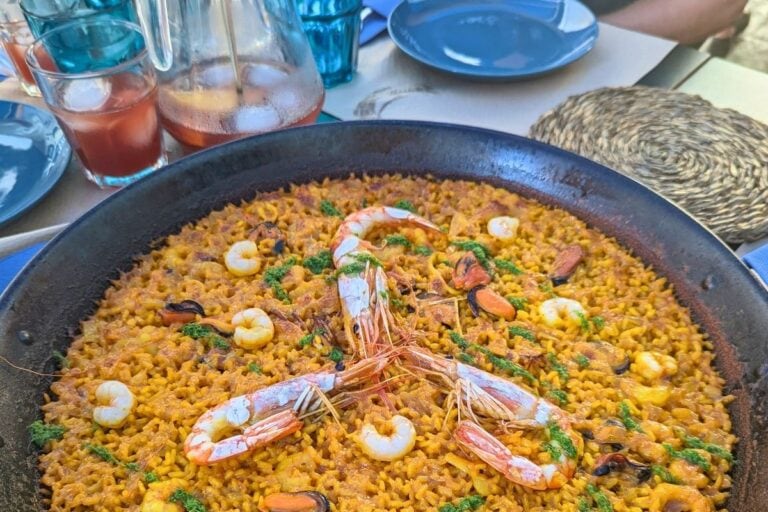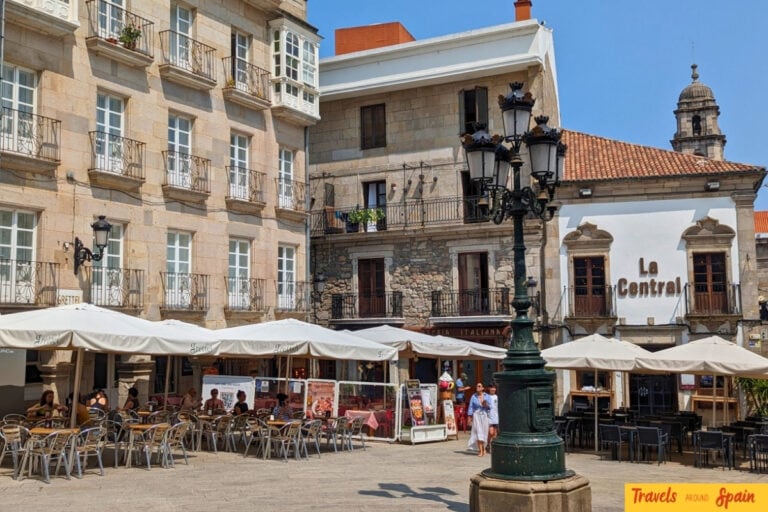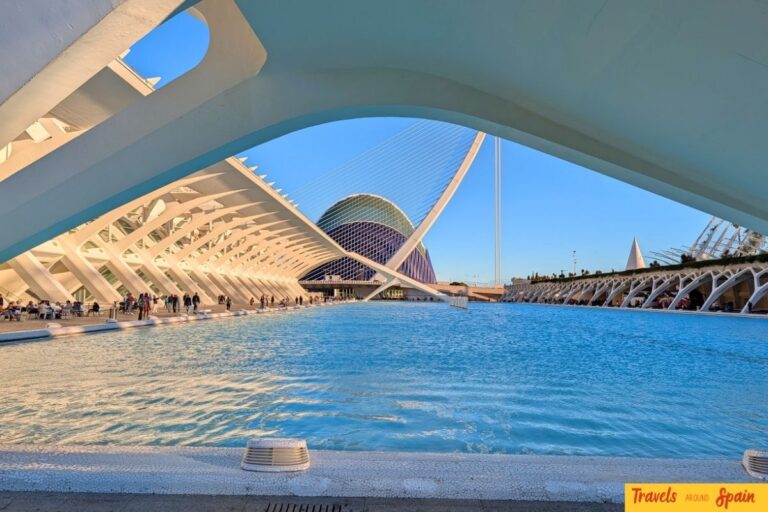Do People Speak English in Gran Canaria?Your Complete Language Guide 2025
Everything you need to know about language barriers abroad
By Liam Mulligan | Published on July 26, 2025 |Modified on July 26, 2025
Travelling to Gran Canaria and worried about the language barrier? You might be wondering: do people speak English in Gran Canaria? Will I need to learn some Spanish? Will I struggle to communicate in restaurants, hotels, or when asking for directions?
Yes, people do speak English in Gran Canaria – especially in tourist areas where English-speaking staff are the norm. As a former Spanish teacher with a decade of experience and having visited Gran Canaria numerous times, I can reassure you that the language barrier in the Canary Islands is minimal.
In fact, you’ll be pleasantly surprised by how English-friendly this Spanish destination really is. English in Gran Canaria is widely spoken throughout tourist zones, making Gran Canaria communication straightforward for British visitors.
Here’s the brilliant news for British holidaymakers: Most tourism workers speak excellent English as part of their professional training, from hotel receptions to restaurant staff with English menus readily available.
That said, learning a few basic Spanish phrases will enhance your experience and show respect for the local culture, but it’s absolutely not essential for a successful holiday.
In this comprehensive guide, I’ll share exactly what to expect regarding English spoken in Gran Canaria, where you’ll find the best English-speaking support, and give you my professional Spanish teacher experience and tips for navigating any communication challenges. By the end, you’ll feel completely confident about your upcoming Gran Canaria adventure.
Quick Answer: Do People Speak English in Gran Canaria?
Yes, English is widely spoken in Gran Canaria, especially in tourist areas. As a former Spanish teacher with 10 years’ experience, I can confidently say the language barrier in Gran Canaria is minimal for English-speaking visitors.
English Levels by Area:
Hotels: ⭐⭐⭐⭐⭐ (Excellent – all reception staff fluent)
Restaurants: ⭐⭐⭐⭐ (Very good – English menus common)
Tourist Shops: ⭐⭐⭐⭐⭐ (Excellent – automatically speak English)
Transport: ⭐⭐⭐ (Good – basic English, pointing works)
Attractions: ⭐⭐⭐⭐ (Very good – multilingual guides)
Where You’ll Find the Best English:
- Maspalomas & Playa del Inglés
- Las Palmas tourist centre
- All major hotels and resorts
- Tourist restaurants and bars
Bottom Line: Language won’t stop you enjoying Gran Canaria. English in Gran Canaria is so widespread that many tourists never need Spanish, though locals appreciate any effort to speak their language.
PLAN YOUR SPANISH ADVENTURE WITH MY FAVOURITE RESOURCES
Best Accommodation Site: Booking.com
Book Day Tours Here: Get Your Guide
Book Airport Transfers Here: Holiday Taxis
The Reality of English in Gran Canaria
English is widely spoken in Gran Canaria thanks to its massive tourism industry. With its sunny year round climate, the island is the perfect place to go on holiday, no matter what the season. With temperatures hotter than most of the rest of Europe during the cold winter months, tourists flock to the island to escape the cold.
Gran Canaria tourism attracts over 4 million visitors annually, making English widely spoken in Gran Canaria and a business necessity. The island is particularly popular with northern Europeans, including British tourists, who make up around 1 million visitors each year – that’s roughly 25% of all tourists. Significant groups from other countries include German, Dutch and Scandinavian tourists.
With such a large number of British tourists on the island, speaking English in Gran Canaria has become an economic necessity for business success. Unlike mainland Spain where English is less common, the Canary Islands English speaking culture has developed specifically to serve international visitors.
English in tourist areas like Maspalomas, Playa del Inglés, and Las Palmas is now the norm. Businesses in the tourist industry train staff in English as standard to ensure that their businesses can compete effectively. From restaurants to bars to shops, you’ll find English-speaking workers throughout these areas.
This creates a stark contrast with Gran Canaria vs mainland Spain English levels. While you might struggle to find English speakers in rural Andalusia or inland Castile, Gran Canaria tourism English training has made English proficiency a valuable job skill.
The result? English is widely spoken in Gran Canaria has become the reality, particularly in areas where tourists spend their time. Hotel reception desks, restaurant servers, tour guides, and shop assistants have typically received English language training as part of their professional development.
This tourism-focused economy means that as a British visitor, you’ll find communication much easier in Gran Canaria than in many other Spanish destinations.
Where You’ll Find Excellent English
You’ll be pleasantly surprised by how widespread English is in Gran Canaria. My partner, who is a non-Spanish speaker, was able to communicate in all of the various bars and restaurants we went to in Maspalomas and Las Palmas, without any difficulty.
Many staff would automatically switch to English which was great for him but a little frustrating for me at times when I wanted to speak Spanish. This English-speaking staff presence in Gran Canaria makes it incredibly tourist friendly.
Hotels & Accommodation
The level of English in hotels is generally very high. Geared towards foreign tourists, all the reception staff we encountered at our hotel (Mur Apartments Buenos Aires – check out our full thoughts on our stay) spoke great English, but thankfully for me, were happy to speak in Spanish. Hotels with English-speaking staff are the norm in tourist areas, making check-in and requests effortless.
Bar staff around the pool and hotel restaurant staff also spoke a good level of English, leading to seamless interactions with many of the guests. This level of English in Gran Canaria hotels surpassed our expectations.
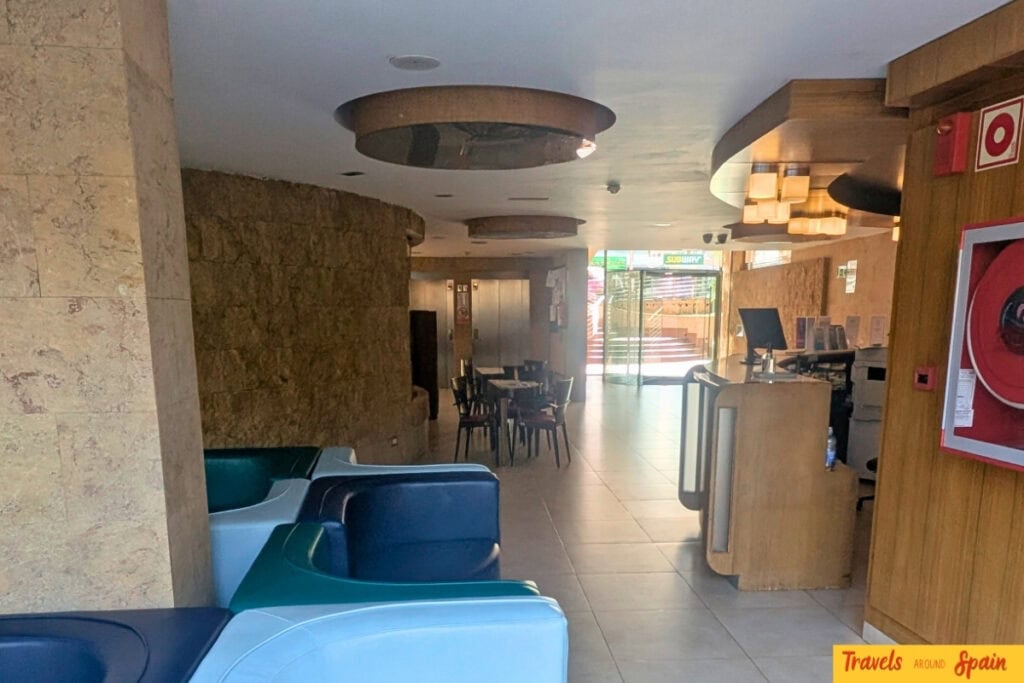
Restaurants & Bars
In tourist areas such as Maspalomas and Playa del Inglés, you’ll have no problem speaking in English. Menus are often displayed in multiple languages with English being one of them. Waiters all have a good level of English and are used to English tourists. Whilst I spoke in Spanish, my partner had no problems making himself understood in English.
Even at local Spanish restaurants, staff switch to English when they hear you’re British. Whilst I spoke in Spanish, my partner had no problems making himself understood in English. English menus in Gran Canaria often include helpful descriptions, making ordering straightforward for anyone worried about communication.
Tourist Attractions & Activities
English support at Gran Canaria attractions is excellent throughout the island. Tour guides are typically multilingual, speaking English, German, and Spanish fluently. At major attractions like the Maspalomas Dunes and Las Palmas Cathedral, information desks always have English-speaking staff available.
When we visited the cathedral in Las Palmas, while I chatted in Spanish, other tourists were communicating perfectly well in English and getting their questions answered. Tour operators automatically provide English commentary, and ticket offices handle English bookings without any issues. Even smaller attractions have basic English signage and staff who can communicate essential information clearly.
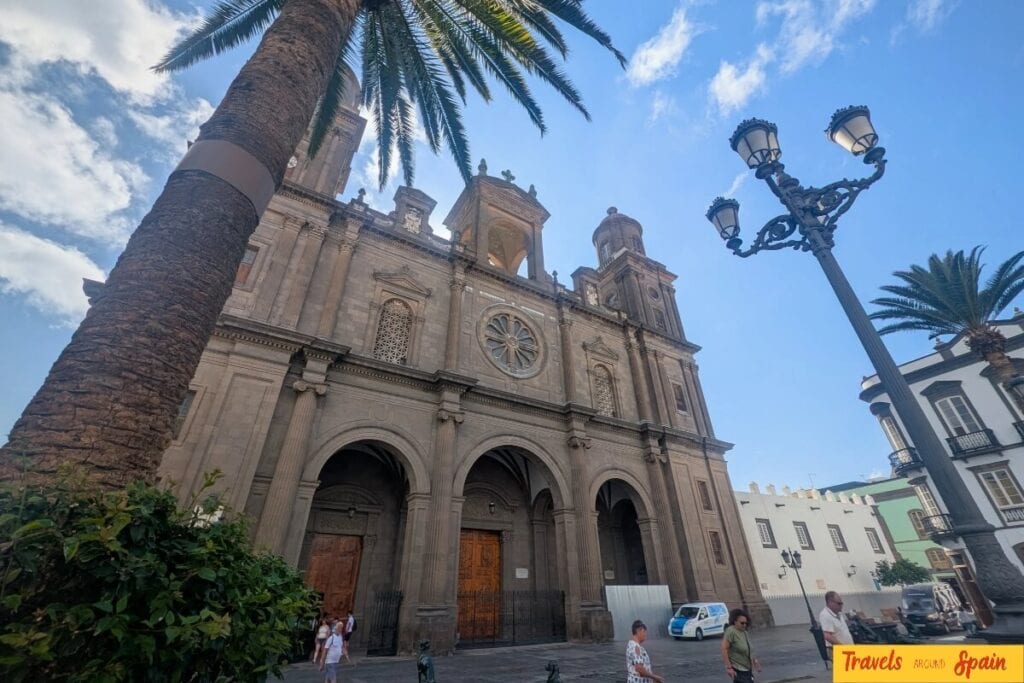
Shopping & Services
Shopping in Gran Canaria is effortless in tourist areas thanks to widespread English. Major shopping centres like Las Arenas in Las Palmas have staff who speak excellent English. Tourist shops automatically greet you in English when they hear you’re British.
In supermarkets, while checkout staff might have limited English, the process is straightforward – pointing and basic numbers work perfectly. In local shops, I found that while I spoke Spanish when asking about card minimums, many English-speaking staff are available throughout tourist areas to help international visitors. Pharmacies particularly have good English, as they’re used to helping tourists with health concerns. Just make sure you know whether you’ll need euros in Gran Canaria before heading to the shops
Where English is More Limited
Whilst English levels are generally high in Gran Canaria, there are some areas where English is more limited. However, even in these areas, you will still be able to get by. The local people are very friendly and will help you overcome any language challenges.
The first area where you’ll notice this is in local neighbourhoods away from tourist zones. With fewer tourists, restaurants and bars don’t have the same need to have English-speaking staff to compete. In the interior, north and west of the island, you’ll find many more areas where locals primarily speak Spanish only.
You may also find that English is more limited in some of the more traditional Spanish restaurants. We visited some traditional Spanish restaurants in Maspalomas on our recent trip, but all of these spoke English due to being in a tourist-heavy area. When you head away from the tourist areas, you’ll find local restaurants operating primarily in Spanish.
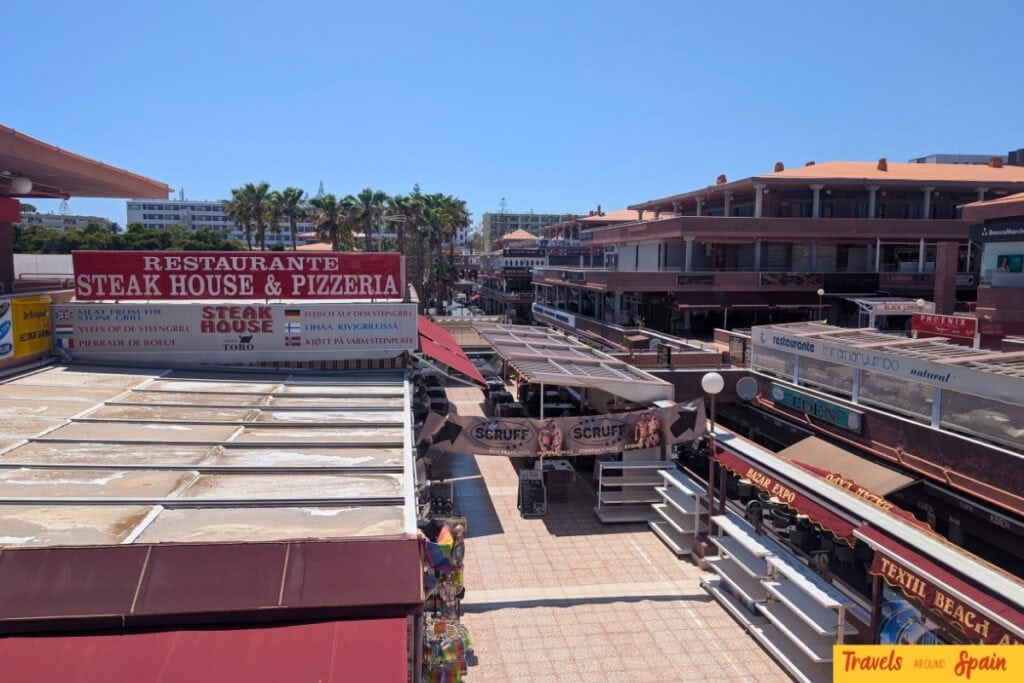
Some taxi drivers may have basic English, though levels vary considerably. Many know essential phrases, but if you’re worried about communication, consider using ride-sharing apps where you can input destinations without speaking.
You’re unlikely to need government offices as a tourist, but these typically operate in Spanish only. The key point? Even where English is less common, the combination of friendly locals, patience, and a bit of pointing goes a long way.
The bottom line is that while English in local areas might be less widespread, Gran Canaria’s welcoming culture means you’ll always find a way to communicate.
Essential Spanish Phrases for Gran Canaria
As a fluent Spanish speaker and a Spanish teacher for ten years, I’ve got you covered with some essential Spanish Gran Canaria phrases for your trip. Whilst it’s not essential to speak Spanish in the tourist areas in Gran Canaria, making an effort by speaking Spanish is respectful and appreciated by the locals. In my time in Spain, I’ve received many a free drink for chatting to the staff in Spanish.
Here are my top phrases with pronunciation guides to help your Gran Canaria Spanish experience.
Basic Greetings & Politeness
- Hola (OH-lah) – Hello
- Buenos días (BWEN-os DEE-as)– Good day
- Buenas tardes (BWEN-as TAR-des) – Good afternoon/evening
- Gracias (GRAH-see-as) – Thank you
- Por favor (por fah-VOR) – Please
Teacher’s tip: Always start with a greeting – it shows respect.
Restaurant Essentials
- La cuenta, por favor (lah KWEN-tah por fah-VOR) – The bill, please
- ¿Qué recomienda? (kay reh-koh-mee-YEN-dah?) – What do you recommend?
- Esto, por favor (ES-toh por fah-VOR) – This one, please (while pointing)
- Sin gluten (seen GLOO-ten) – Gluten-free
Teacher’s tip: Point at menus while saying ‘esto’ (this) works perfectly.
Getting Around
- ¿Dónde está…? (DON-deh es-TAH?) – Where is…?
- ¿Cuánto cuesta? (KWAN-toh KWES-tah?) – How much does it cost?
- Playa (PLAH-yah) – Beach
- Hotel (oh-TEHL) – Hotel
Teacher’s tip: Download offline maps as a backup.
Emergency & Help
- ¿Habla inglés? (AH-blah in-GLAYS?) – Do you speak English?
- No entiendo (no en-tee-YEN-doh) – I don’t understand
- Ayuda (ah-YOO-dah) – Help
- Lo siento (loh see-YEN-toh) – I’m sorry
Teacher’s tip: Don’t worry about perfect pronunciation – urgency is clear.
Professional Language Tips from a Spanish Teacher
After ten years of teaching Spanish and countless trips to Spain, here’s my professional Spanish advice for making the most of your Gran Canaria experience.
Smart Use of Translation Apps
Google Translate is brilliant, but download the offline Spanish pack before you travel – you won’t always have reliable internet. The camera feature is a game-changer for menus, but here’s my top tip for Spain: don’t rely on it for conversations. Use it for key words, then speak directly to people. Spanish speakers appreciate the effort, even if your pronunciation isn’t perfect.
Cultural Communication Insights
Spanish people communicate with their hands – don’t be afraid to gesture! They’re also naturally warm and expressive, so what might seem like arguing is often just passionate conversation. Eye contact and smiles matter more than perfect grammar. In my experience teaching, the biggest cultural communication breakthrough happens when students stop worrying about mistakes and start enjoying the interaction.
Common Tourist Mistakes I’ve Observed
The biggest tourist language mistakes I see? Speaking too quietly. Spanish speakers are naturally expressive – don’t whisper your Spanish! Also, many tourists say “gracias” for everything, but “de nada” (you’re welcome) is equally important to learn. And please, don’t feel embarrassed about your accent – locals find British attempts at Spanish endearing, not amusing.
Professional Pronunciation Advice
Here’s my Spanish teacher advice: don’t stress about rolling Rs. Seriously. I’ve taught hundreds of students, and clear consonants matter more than perfect Rs. Focus on vowel sounds – Spanish vowels are pure and consistent, unlike English ones. Practice saying “a-e-i-o-u” clearly, and you’re halfway there.
My biggest language tip for Gran Canaria? Learn “lo siento, no entiendo, ¿puede hablar más despacio?” (Sorry, I don’t understand, can you speak slower?). This phrase has saved countless conversations and shows respect while buying you time.
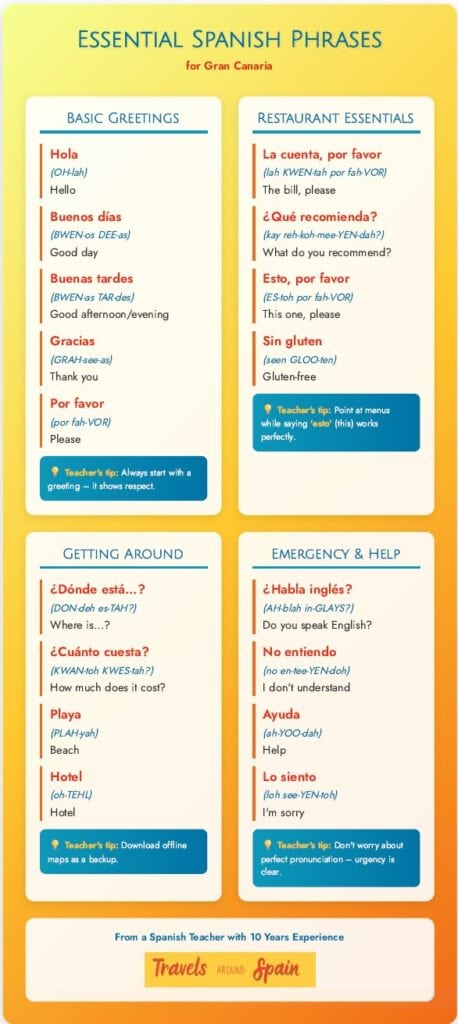
Different Areas of Gran Canaria
Despite Gran Canaria being a tourist hub, you should still expect different levels of English proficiency. The English spoken in tourist areas vs local areas across the island can vary quite dramatically, despite the island being fairly small.
Maspalomas English speaking culture is intertwined with its status as a prime holiday destination. With so many foreign tourists, English is spoken everywhere – shops, restaurants and bars will all communicate with you in English. In places such as the Yumbo Centre, you’ll meet many British people working in the bars, making English the go-to language in many situations. English in Playa del Inglés follows the same pattern, with virtually every business catering to English speakers. These English-speaking areas make communication effortless.
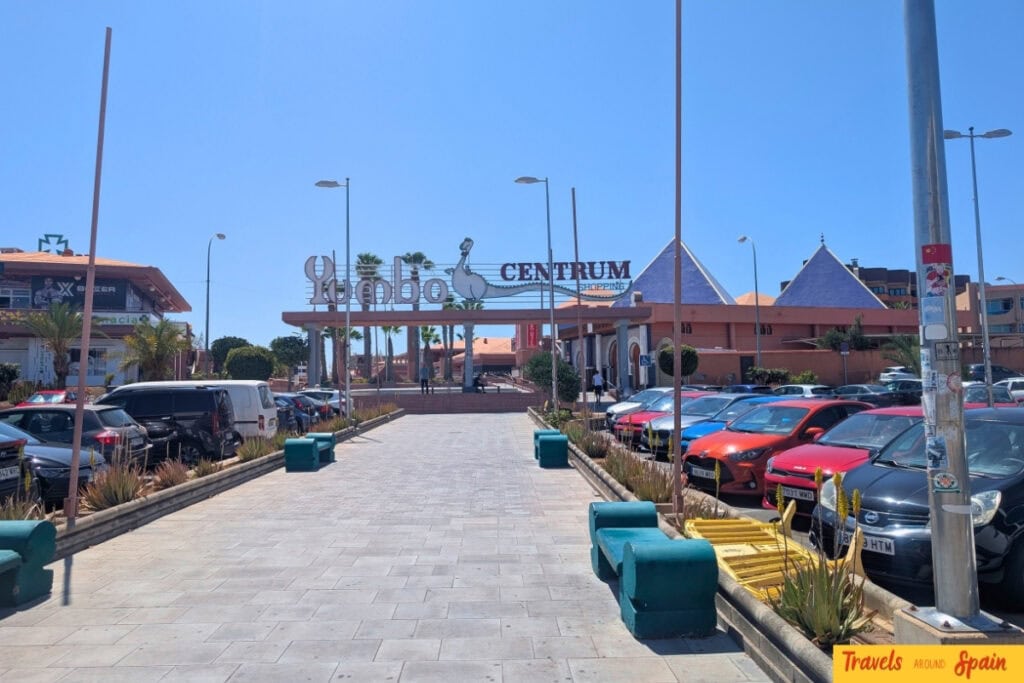
When visiting the capital Las Palmas (perhaps on a day trip!), you’ll encounter much more varied Las Palmas English levels. The Las Palmas English-speaking areas are centred around tourist attractions – expect to hear English in souvenir shops, restaurants, bars and stores in the Triana district. As you head away from the centre to more local establishments, English proficiency levels decrease and you’ll need more Spanish.
Contrast this to Gran Canaria mountain villages where Spanish is the go-to language. In these rural areas, there isn’t as great a need to speak English for economic advantage, creating clear regional language differences in Gran Canaria.
The tourist areas vs local areas contrast is stark. If you’re heading on a summer (or winter!) holiday to Gran Canaria and staying in the tourist-focused areas of Maspalomas, Playa del Inglés or Puerto Rico, you’ll be absolutely fine speaking English. However, venture inland for an authentic Spanish experience where your language skills will be truly tested.
My Experience: Spanish Teacher Meets Tourist Reality
As a Spanish teacher, my Gran Canaria trips gave me a unique perspective on the island’s language dynamics. I discovered that while English truly is widespread, speaking Spanish opened doors to more authentic local interactions.
At the airport on departure, the check-in desk lady was absolutely delighted when I chatted away in Spanish. She was genuinely surprised that an English person spoke fluent Spanish and became incredibly friendly throughout the process. This showed me how much locals appreciate the effort, even in brief encounters.
Our hotel bar staff always spoke Spanish with me, despite speaking perfect English with other guests. The lady working there became particularly friendly, and we had lovely conversations about life on the island – conversations I couldn’t have had in English alone.
In Las Palmas tourist spots, my Spanish proved invaluable. At the cathedral, I watched the information desk woman visibly relax when I asked questions in Spanish. She became animated and passionate, explaining the history in detail – clearly more comfortable in her native language than the basic English she’d been using with other tourists.
At Sparkles bar in the Yumbo Centre, English dominated completely – which makes perfect sense as it’s English-owned and operated. This showed how the language experience varies dramatically by location and ownership.
Getting the bus was much easier in Spanish, and in shops, while staff spoke excellent English, asking about card minimums in Spanish felt more natural and received warmer responses.
The reality? My teaching background gave me insights most tourists miss – locals genuinely appreciate any Spanish effort, even in this English-friendly destination.
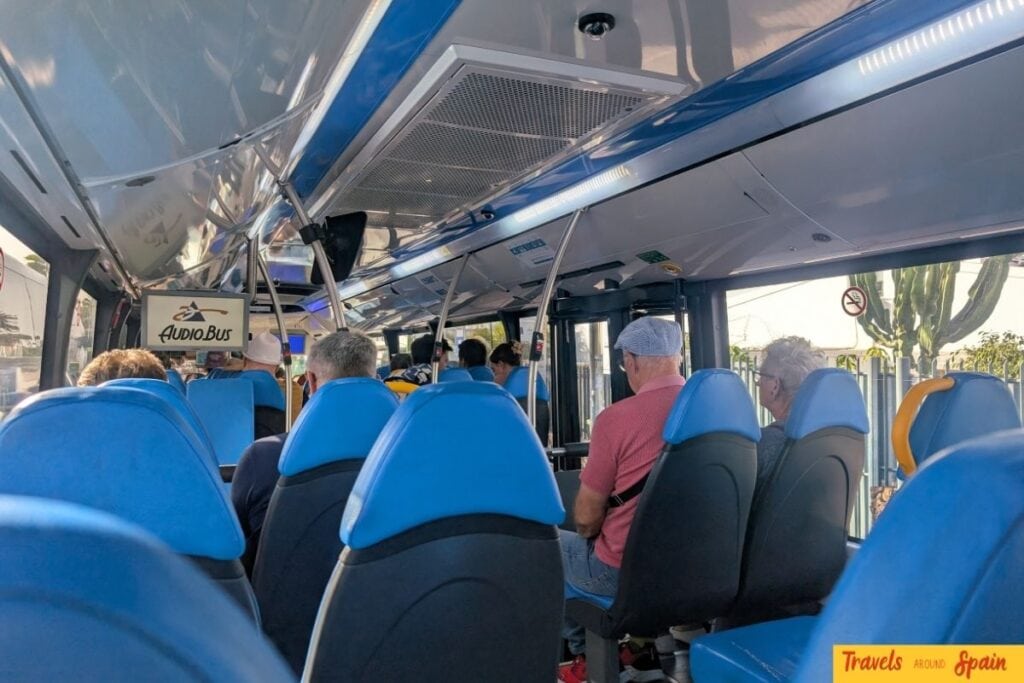
FAQs
Do hotel staff speak English in Gran Canaria?
Yes, virtually all hotel staff speak excellent English in Gran Canaria. With so many English-speaking tourists, it is a requirement to speak English for many job positions in the tourist industry.
Can I get by without speaking any Spanish in Gran Canaria?
Absolutely. In tourist areas such as Maspalomas and Playa del Inglés, you’ll have no problems whatsoever. In Las Palmas, there is a mix of English and Spanish, but you will be fine in the tourist areas. Inland, there is less English spoken, so be prepared if you plan on going on a day trip.
Do restaurants have English menus in Gran Canaria?
In tourist areas, restaurants offer English menus (and indeed in many other languages – we saw German, Dutch, Swedish, Finnish and Icelandic menus!) and will often have these outside so you can decide before entering. More rural areas will have menus only in Spanish, and sometimes you’ll have to ask what the menú del día is in the local language.
Is English spoken in Las Palmas?
Yes, English is spoken in Las Palmas especially in the city centre and tourist areas. You will have no problem communicating in English.
What Spanish phrases should I learn for Gran Canaria?
A few basic phrases like Hola (hello), Gracias (thank you), and ¿Habla inglés? (do you speak English?)are incredibly useful and are appreciated by the local Canarians.
Do taxi drivers speak English in Gran Canaria?
Many do, especially in tourist areas, though levels do vary. If you are worried about the language barrier, consider using an app like Uber which will enable you to put in your destination with no communication issues.
Language Resources from a Former Spanish Teacher
Being a former Spanish teacher with ten years of experience, I have my finger on the pulse as to what are the best Spanish learning resources. I worked in a private school in the UK and an international school in the US where languages were viewed as highly important and I would often have queries from parents asking how to support their child’s language learning. So here are my teacher recommended apps and resources.
Everyone at this point will have heard of Duolingo. This app is great for the foundations of the language but it doesn’t really lead to real communication. I know people with 500 day plus streaks who will walk into a restaurant in Spain and freeze.
My Top Recommendations:
Apps for Spain Travel:
- Babbel – Much better than Duolingo for practical conversations you’ll actually use
- Memrise – Native speaker videos, excellent for vocabulary building
- Google Translate – Essential with offline mode downloaded before your trip
- Wordreference – Best Spanish dictionary app with reliable translations
Online Learning:
- Italki – Best way to start speaking with real Spanish tutors. I used this platform over the COVID lockdown to learn some Italian and loved it!
- Notes in Spanish – A great podcast I used at university and then with my own students. Loads of great cultural topics and authentic phrases.
- Easy Spanish YouTube videos – Real street conversations with subtitles
- Conjuguemos – Verb practice (the teacher in me couldn’t resist!)
Emergency Language Tips: Download Google Translate offline, screenshot key emergency Spanish phrases on your phone, and learn numbers 1-100 for prices and addresses. While preparing for your trip, don’t forget other practical considerations like whether you can drink the tap water in Gran Canaria – it’s always better to know before you go.
Final Thoughts: The Professional Language Teacher’s Verdict
Gran Canaria is undoubtedly one of the more English-speaker-friendly destinations in Spain. As one of Spain’s most tourist-focused autonomous communities, the need to speak English is far greater than many regions on the mainland, which makes it easier for English-speaking visitors.
Based on my professional opinion as a Spanish teacher, Gran Canaria ranks among the most English-friendly destinations in Spain. On my trips to Gran Canaria, I have seen many English-speakers have no trouble at all communicating in English.
In fact, many bars like Sparkles Bar in the Yumbo Centre, are aimed at English speakers and all the interactions are in English. In the tourist areas such as Maspalomas, Playa del Inglés and Puerto Rico, you will have no problems with speaking English.
This language teacher verdict for Gran Canaria is overwhelmingly positive for nervous English-speaking travellers. Compared to other Spanish destinations, Gran Canaria’s tourism industry has created an exceptionally welcoming environment for international visitors.
That said, when visiting a different country, you always get that extra insider experience for at least attempting to speak the language. By learning some Spanish before you go, you show the local people that you are making an effort. In many cases, speaking Spanish in tourist areas has led to me receiving free drinks, being served quicker and finding out insider tips about the place I’m visiting.
My expert language assessment? Don’t let language fears stop you booking that Gran Canaria holiday – you’ll be absolutely fine, and might even surprise yourself with how much Spanish you pick up along the way!
About Me

My name is Liam and I’m the owner and author of ‘Travels Around Spain’. I have been obsessed with Spain ever since my first visit 35 years ago. I am on a mission to visit and discover every part of this beautiful country and share all my hints and tips with you all.
Read more about my journey by clicking here.

